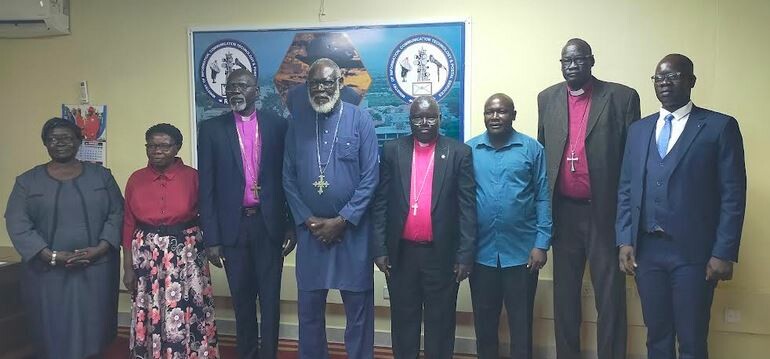The Evangelical Alliance of South Sudan on Monday said they want to work with the government to promote peace among citizens without criticizing the government.
Addressing a news conference in Juba, Bishop Elias Taban, the chairperson of Alliance, said the South Sudan Council of Churches (SSCC) has tried its best to push for peace although he does not understand the approach they use.
He said they need to be able to listen to the government and see how they want to proceed with the peace agreement and how the church can advise.
The prelate recalled that some years ago he was invited by UNMISS to attend a meeting with the Security Council delegation of three people that came to Juba, and in the presence of the Council of Churches and they ended up discussing issues that were not meant to be discussed with the delegation.
“When we say our position before sharing it with our government and we share with the Security Council or another international body, we are already accusing without the knowledge of our government. Later on, these kinds of information get back to the government and the government begins seeing us as people who are working against them,” Bishop Taban said. “Our approach is that if we are given the chance, we want to listen to the government on how are they doing and what are they supposed to do and why are they not doing it and we dialogue on those lines. During the liberation struggle, we had a dialogue, the Kajiko 1 with the movement and later we had Kajiko 2 in Juba with the government.”
He added: “As we speak, the director in the Office of the President is telling us we need to dialogue and we believe that when we are given the chance we will be able prayerfully to find a way to resolve issues.”
The churchman observed that evangelicals have not been as active as they used to be before the signing of the Comprehensive Peace Agreement (CPA) in 2005 when they worked hard to achieve peace.
“We have not been active and if we have done something, it has been finger-pointing and seeing criticisms from our colleagues which provokes another conflict so we should change our approach and instead of fighting the government we should be able to show the way forward,” he said.
Bishop Taban also called on the signatories to the peace agreement to dialogue and compromise on whether elections should take place or not.
“If elections are going to be peaceful and will bring us a lasting peace, we go for it, but if elections are not going to be peaceful and if an extension of the transitional period will bring us peace, let’s extend it. So, the parties have to dialogue on whether to go for elections or extension. I cannot say go for elections and I cannot say extend but we need what will give us peace because we are not ready to return to war,” he stated. “When we talk of elections, we need to be understanding that you can go and campaign in rural areas. Are they safe? Can I go to Yei and every village and campaign without any threat. I need to ensure that if I go to campaign in those rural areas, I am safe.”
For his part, Bishop Arkanjelo Wani Lemi, the General Secretary of the Evangelical Alliance, said they realized that they have been aloof in bringing peace to the African continent.
“The Evangelical Alliance has to be proactive in engaging with issues that are current, with issues that are bedeviling our continent, so with that realization, it now puts us in a place where we have to sit down and ask what it is that we did not do well,” he said. “How do we engage and resonate with the problems and difficulties on issues that we have in our respective countries.”




